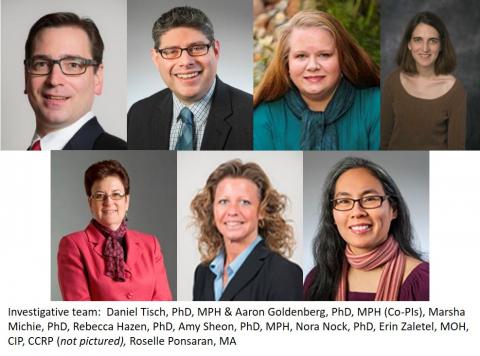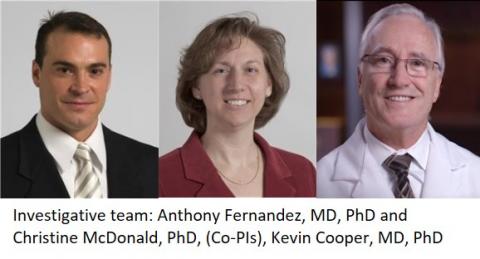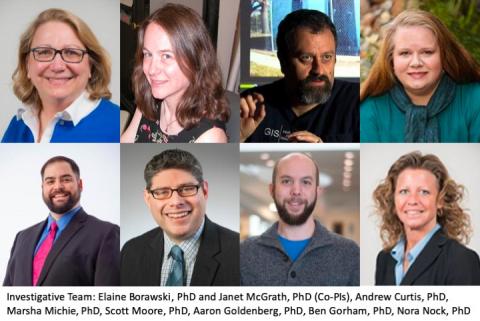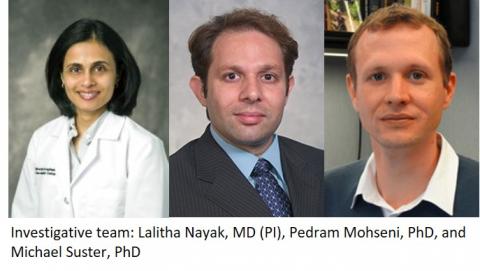Improving Every Life
The next cycle of the CTSC aims to enhance research innovation and impact health equity in Northeast Ohio and beyond.
August 2, 2023 -- We are pleased to announce we have received a fourth round of funding from the National Center from Advancing Translational Sciences at NIH! We join over 60 other Clinical and Translational Science Award Hubs in NCATS' mission to "bring more treatments to all people more quickly."
In the first three award cycles, the CTSC has catalyzed the growth of clinical and translational science across Case Western Reserve University and our four clinical partners in Cleveland: Cleveland Clinic, MetroHealth, University Hospitals, and the Louis Stokes Cleveland Veterans Affairs Medical Center. In this new grant cycle, we are expanding beyond the Cleveland area to become the CTSC of Northern Ohio with the addition of two new partner institutions, University of Toledo and Northeast Ohio Medical University. The new partners will expand our scope and reach and maximize impact in workforce development, rural medicine, dissemination and implementation, and on vulnerable populations.
When I think about research, I think about improving every life, regardless of demographics, geography, or disease type. I think of giving hope to those who have diseases without available therapies. All research is valuable, from basic lab to translational and clinical, to community research. The CTSC is about improving health through collaborations; there is a wealth of talent at CWRU and our six amazing clinical partners. We need to join our amazing complementary expertise to enhance and expedite innovation and educate and build the next generation of researchers and research professionals. We all thrive on one goal—improving health for our local communities and beyond.
Please take a moment to read Dean Gerson's message, as well as CWRU's press release about our award to hear from leadership at our partner institutions and learn more about our next cycle. Stay tuned for new and improved news, events, and resources. We look forward to working with you to improve every life over the next seven years. Cheers!
-----
The Clinical and Translational Science Collaborative (CTSC), a collaborative among Case Western Reserve University (CWRU) and its partner institutions, Cleveland Clinic, MetroHealth, University Hospitals, Louis Stokes Cleveland Veterans Administration Medical Center, University of Toledo, and Northeast Ohio Medical University, is a catalyst for high quality clinical and translational research both locally and nationally. The CTSC provides key services to investigators, trainees, and staff at CWRU and its collaborating institutions to facilitate clinical and translational research. The CTSC’s mission is to change the culture and environment of biomedical research, share resources and expertise, and streamline the research process to move translational research from bench to bedside and to the community. The CTSC is supported by the National Institutes of Health National Center for Advancing Translational Sciences through federal grant UM1TR004528.
Gelise Thomas, CTSC Assistant Director of Strategic DEI & Health Disparities, selected to Crain’s Cleveland Business’ “Forty Under 40” Class of 2022
November 21, 2022 -- TheDaily -- Since joining Case Western Reserve University School of Medicine in March of this year, Gelise Thomas has made an immediate impact by creating programs and leading initiatives to help researchers understand their roles in helping to close the gaps in health disparities.
Thomas directs strategic diversity, equity, inclusion and accessibility (DEIA), and health disparities efforts in the Clinical and Translational Science Collaborative (CTSC), working with researchers across Cleveland’s healthcare institutions—such as MetroHealth, Cleveland Clinic, University Hospitals and the Louis Stokes Cleveland Department of Veterans Affairs Medical Center—to provide education and resources needed to integrate DEIA into medical research.
Recognized as a “trailblazer” and a “standout” by her colleagues, Thomas was recognized by Crain’s Cleveland Business as one of the publication’s “40 Under Forty” local leaders for 2022.
Thomas graduated from The Ohio State University with a political science degree and earned a law degree from Cleveland State University. Before joining University Hospitals and transitioning to healthcare in 2019, she worked in economic development roles at MidTown Cleveland and the Greater Cleveland Sports Commission.
“Understanding and meeting the urgency of the work ahead of us in advancing health equity through research is both an opportunity and obligation that I don’t take lightly,” said Thomas. “This recognition affirms the importance and impact of our work in proximity to efforts led by other honorees focused on improving healthcare and implementing holistic solutions that address social determinants of health.”
Launching one-to-one consultations, spearheading a health equity educational series and participating in community events are just a few of the initiatives she has led in the short time she has been at the university to help raise awareness to change the current trajectory of health disparities.
“At the start of this new chapter in our CTSC, we embraced what we don’t know,” said Grace McComsey, principal investigator of the CWRU-based CTSC of Cleveland. “For a long time, we established that research is not inclusive or diverse, and, as such, has not widely benefited the community we serve—we still lack a clear understanding of how to fix these shortcomings. Thomas was hired to focus with us on finding solutions to ensure that through research, we improve the lives of all communities.”
Thomas, along with her fellow Crain’s Cleveland Business’ 2022 “Forty Under 40” cohort, were honored at a ceremony Nov. 21, and are featured in a recent issue of the publication.
Clinical and Translational Science Collaborative at Case Western Reserve University Hosts The Color of Care Documentary Screenings and Discussions
November 8, 2022 – The Clinical and Translational Science Collaborative (CTSC) at Case Western Reserve University aims to advance health equity, through translational science, with an emphasis on getting more treatments to all people more quickly. In pursuit of this mission, the CTSC prioritizes the importance of diversity in studies and trials within the scientific workforce, patient, and research participant populations. The CTSC also centers the goal of achieving equity in all of its efforts and initiatives by acknowledging that diversity, equity, inclusion, and accessibility are the building blocks for that achievement by fostering environments where diversity thrives, inclusion and accessibility are the culture, and equity is the outcome. The CTSC’s continued quest for understanding and remediating barriers to inclusion and access will guide and inform research programs and studies that reflect principles and values of DEIA.
One example of the CTSC’s commitment to DEIA is illustrated in their four-part interdisciplinary, multimedia challenge series titled the Mission: Health Equity Challenge Series focused on raising awareness about health disparities and the opportunity to use translational science to close preventable gaps in health outcomes. Researchers, clinicians, caregivers, community members, and Clinical and Translational Science Award hubs nationwide have participated in one or more of the challenges to date. The first challenge, a film screening of and panel discussion about The Color of Care, was made possible by a collaboration with the Western Reserve Historical Society, a Smithsonian Affiliate. The Color of Care is a documentary produced by the Smithsonian Channel and Oprah Winfrey’s HARPO Productions that amplifies the stories of Black and Brown communities and how the COVID-19 pandemic exacerbated existing health disparities. After co-hosting an in-person screening and panel discussion with the Western Reserve Historical Society, CTSC institutional partners Cleveland Clinic, MetroHealth, University Hospitals, and the Louis Stokes Cleveland VA Medical Center committed to hosting screenings and panel discussions, too.
“[…] there are 86 of us on this call. If each of us reaches five people and they reach five people and so on, we can touch and we can truly impact healthcare disparities in greater Cleveland very quickly—I did the math. That’s 67% of greater Cleveland. It’s really up to all of us,” Alan Nevel, Senior Vice President and Chief Equity Officer at MetroHealth, proclaimed during the first virtual screening and panel discussion in October.
As a result of the CTSC’s cross-institutional, collaborative efforts, Gelise Thomas, Assistant Director of Strategic DEI & Health Disparities in the CTSC, shared insights about the challenge series, translational science, and getting more people involved in research with WKYC Channel 3’s senior reporter and commentator, Leon Bibb, in a video segment titled We the People. We the People is a community engagement video series that features local organizations and initiatives.
-----
The Clinical and Translational Science Collaborative (CTSC), a collaborative among Case Western Reserve University (CWRU) and its affiliated hospital systems, Cleveland Clinic, MetroHealth, University Hospitals, and the Louis Stokes Cleveland Veterans Administration Medical Center, is a catalyst for high quality clinical and translational research both locally and nationally. The CTSC provides key services to investigators, trainees, and staff at CWRU and its collaborating institutions to facilitate clinical and translational research. The CTSC’s mission is to change the culture and environment of biomedical research, share resources and expertise, and streamline the research process to move translational research from bench to bedside and to the community. The CTSC is supported by the National Institutes of Health National Center for Advancing Translational Sciences through federal grants UL1TR002548, KL2TR002547, and TL1TR002549.
CTSC Team Publishes First Ever Retrospective Case Study Publication in JCTS
"Investing in innovation for underserved populations saves lives."
October 19, 2021 -- In 2014, Dr. Umut Gurkan, associate professor in the Case Western Reserve University School of Engineering, received a CTSC Annual Pilot to develop HemeChip, an accurate, low-cost, point-of-care diagnostic, specialized for low-income countries, to diagnose sickle cell disease. CTSC pilot funding was the critical catalyst for this study, as Dr. Gurkan has gone on to receive multiple publications, grants, and patents based on this blood assay technology.
-----
A group of evaluation researchers at Clinical and Translational Science Award (CTSA) hubs are conducting retrospective case studies to evaluate the translational research process. CTSC members Dr. Kelli Qua, Shannon Swiatkowski, and Dr. Clara Pelfrey teamed up with Dr. Gurkan to investigate the successful translation of the HemeChip using a protocol for retrospective translational science case studies of health interventions developed by the CTSA evaluation researchers.
Their findings have recently been published in the Journal of Clinical and Translational Science: A Retrospective Case Study of Successful Translational Research: Gazelle Hb Variant Point-of-Care Diagnostic Device for Sickle Cell Disease
This retrospective case study publication was the first-of-its-kind in JCTS. Earlier this year, Dr. Clara Pelfrey and the CTSA evaluation researchers petitioned JCTS to include retrospective case studies as a manuscript category. The objective of these studies is to deepen knowledge of the transitional process and identify contributors to successful translation.
The team identified several barriers to translation which included proving novelty, manufacturing costs, fundraising, and academic-industry relations. Facilitators to translation were CTSA pilot program funding, university resources, entrepreneurship training, due diligence, and collaborations. The barriers to translation, how they were overcome, and the key facilitating facilitators identified in this case study pinpoint areas for consideration in future funding mechanisms and the infrastructure required to facilitate successful translation.
-----
The Journal of Clinical and Translational Science (JCTS) is the official journal of the Clinical Research Forum and the Association for Clinical and Translational Science, published through Cambridge University Press. The journal aims to provide exceptional academic content in all areas of clinical and translational science research.
InfoReady Review Supports Rapid Response COVID-19 Pilot Awards at Case Western Reserve University
Oversight Provided by the CTSC of Cleveland

July 29, 2020 -- In response to the SARS-CoV-2 pandemic, over 250 Case Western Reserve University faculty teamed up to form the COVID Research Taskforce, under the direction of Dr. Jonathan Karn and Dr. Nora Singer, one of the co-leads of the CTSC of Cleveland’s Hub Research Capacity component. “The goal of this university-wide initiative is to attack the pandemic from many sides,” said Singer, “addressing a wide range of COVID-related questions including understanding and advancing knowledge on fundamental virology and immunology of SARS-CoV-2; barriers and challenges in testing, tracing, diagnosis and treatment; impact of the pandemic on vulnerable populations, including essential workers, and impact on physical and mental health of the community; ensuring that we do important studies to treat and prevent the biological and psychosocial ramifications of COVID-19 and its aftermath.”
To support this effort, the Taskforce, with support from the CTSC of Cleveland and six other funding groups across campus, created a Rapid-Response COVID-19 Pilot Award to support new research initiatives that will make immediate progress towards reducing the harm to individuals, groups, and society from SARS-CoV-2 and the COVID-19 pandemic. Elaine Borawski, PhD, faculty lead of the CTSC Community and Collaboration component and her team coordinated the submission, review, and selection process on behalf of the Taskforce through InfoReady. 18 pilot projects from a pool of 48 were awarded within a one-month timeframe of submission.
“We knew from the beginning this would be a herculean task to coordinate in such a short period of time, but the InfoReady Multitrack template allowed us to treat each funding group as a separate track, each with specific requirements and reviewers, while at the same time, maintaining a standardized, coordinated approach across all the whole pilot program. And now, we will continue using the system for tracking the progress through the internal reporting mechanism. We are grateful for the tremendous support we received from the IR technical support group. They were with us every step of the way,” said Elaine Borawski, PhD.
Together the seven funding partners awarded over $500,000 to fund 18 research pilot projects ranging from understanding lung immunity after COVID-19 and the role of glycemic control in COVID-19 disease severity, to developing new diagnostic methods and devices, to understanding neighborhood-level vulnerabilities and risks and the impact of COVID-19 on cancer patients.
The CTSC of Cleveland funded the following 5 projects, and co-sponsored one additional project with the CWRU Swetland Center for Environmental Health:
Addressing ethical, social, and regulatory issues in research during the COVID-19 pandemic
Awardee: Daniel Tisch and Aaron Goldenberg (Co-PI)
Departments of Population and Quantitative Health Sciences and Bioethics, CWRU School of Medicine
Proposal: “Research during the COVID-19 raises new ethical, social, and regulatory questions for researchers and participants. Our goal is to advance COVID-19 research ethics through engagement with stakeholders and the creation of regulatory guidance resources to support research during pandemics.
“This project bridges regulatory bodies (IRBs, public health departments, clinical care, and the research community) to promote an ‘ethical and socially grounded’ translational pipeline for COVID research.”

Determining the diagnostic and prognostic value of underlying cutaneous disease and cutaneous eruptions in patients with COVID-19
Awardee: Anthony Fernandez and Christine McDonald (Co-PI)
Department of Inflammation and Immunity, Cleveland Clinic
Proposal: “Skin manifestations of viral illnesses are common, and are sometimes used to identify infection or predict disease outcomes. Since the onset of the COVID-19 pandemic, a variety of rashes in affected patients have been described.
“Given that skin rashes can be easily identified visually and immediately acted upon, this study will define features of COVID-19 skin conditions using patient samples and determine their utility to define disease onset or predict disease outcomes in COVID-19 patients.”

Neighborhood context of social vulnerability and perceptions of COVID-specific risk and prevention
Awardee: Elaine Borawski and Janet McGrath (Co-PI)
Department of Population and Quantitative Health Sciences, CWRU School of Medicine; Department of Anthropology, College of Arts and Sciences
Proposal: “The COVID pandemic has reinforced the importance of location and neighborhood context on health and well-being. Combining neighborhood data and local input, this interdisciplinary project will enhance understanding of the role of place in COVID risk perceptions and behaviors.
“The pilot leverages mixed-methods to create a rich contextualized dataset to better inform public health messaging and interventional efforts to address the disproportionate impacts of COVID among vulnerable neighborhoods.”

Glycemic control and COVID-19 disease severity among patients with chronic kidney disease
Awardee: William Bush (PI)
Department of Population and Quantitative Health Sciences, CWRU School of Medicine
Proposal: “Recent reports suggest that COVID-19 patients who cannot control their blood sugar have worse disease than those with controlled blood sugar. The relationship between blood sugar control and COVID-19 has not been examined in the United States.
“We will examine this relationship in Cleveland patients with chronic kidney disease, many of whom have or are at great risk of developing type 2 diabetes. This study may help physicians predict which patients will need extra care when they have COVID-19.”

COVID-19 associated coagulopathy—developing a Point-of-Care Device for Diagnosis
Awardee: Lalitha Nayak (PI)
Department of Medicine, School of Medicine; Case Comprehensive Cancer Center
Proposal: “COVID-19 portends a high risk for blood clots, a major cause of severe disease and death. While monitoring the coagulation status is crucial, presently used assays take time and a significant amount of blood. Our novel point-of-care device uses miniscule quantities of blood to rapidly assess coagulation abnormalities at the bedside.
“We propose to optimize this device so that it can be used specifically in this unique coagulopathy and guide timely intervention in these critically ill patients.”

Understanding the behaviors of dental aerosol flume and engineering effective capture system for COVID-19 risk mitigation (co-funded by the CTSC of Cleveland and the Swetland Center for Environmental Health)
Awardee: Bill Yu and Fabio Piola Rizzante (Co-PI)
Department of Civil and Environmental Engineering, Case School of Engineering; Department of Comprehensive Care, CWRU School of Medicine
Proposal: “Dental treatment procedures produce high-speed dental aerosols, which can carry COVID-19 and possess a major threat to the health of dentists, staff and patients. This collaboration involving engineers and dental clinician will conduct pilot study to understand the behaviors of dental aerosol flume and its interactions with engineered surfaces.
“From these, solutions will be developed to effective capture and sanitize dental aerosols and mitigate the risk of COVID-19 at dental clinics.”

“The CTSC was pleased to both support and coordinate the Taskforce’s city-wide effort to address the challenges brought on by the COVID-19 pandemic”, said Dr. Michael Konstan, Principal Investigator of the CTSC of Cleveland.
The Taskforce welcomes inquiries or SARS-CoV-2 research related questions at SOMCOVID19@case.edu.
Implications to IRB Operations Due to the COVID-19 Pandemic
July 6, 2020 -- Nearly a month ago, we joined a Society for Research Administrators International (SRAI) “virtual happy hour” to discuss with colleagues the implications of the COVID-19 pandemic on Institutional Review Board (IRB) operations. We not only wanted to help and offer advice, but also wanted to learn and hear from others what they were going through during this time.
The discussion began around questions regarding the transition to remote follow-up visits for existing research protocols, and if this required submission of protocol modifications to the IRB. We indicated that there was purposely some flexibility in the regulations for situations like this. The regulations allow for changes to the protocol to be taken without prior IRB review in order to eliminate an apparent immediate hazard to a subject. If a change for this reason would occur, the IRB would want to be informed that the change happened. Investigators should also review protocols, and if in the original protocol it does not specify where visits should take place (i.e. specify in person study visits), then there can be flexibility in terms of switching to virtual visits without a protocol modification. Clinical follow-up visits should be shifted to virtual visits when possible. Therefore, utilize regulatory and protocol flexibility when possible for clinical research visits. Next we discussed potential associated consent changes. We concluded that a revised consent is only required when the original fundamental consent of a participant is impacted by changes. Minor changes in study visits, like changing to remote visits, would not likely rise to that level and can be communicated to participants without the need to re-consent or submit a consent modification.
IRBs experienced significant increases in modifications or amendments to existing research protocols to add COVID-19 related data collections for research purposes. These were instances whereby these data were not originally contemplated in protocols, but now changes to the protocols were necessary in order to gather data during this unique, transient period of time during the pandemic. This was the main cause for additional work and temporarily delays in IRB operations, as more protocol changes were submitted for review. We recommended transparency related to temporary slow downs in operations were necessary. Thus, let investigators know that IRBs were experiencing higher review volumes and provide estimated turnaround times.
We found that not as many new protocols were being submitted, at least during this first six weeks of the shift in operations to virtual IRBs, and that there was not a rush on reliance agreements or collaborative protocols, yet. However, we speculated that the latter might still be coming as we heard that at one institution there were 22 collaborative COVID-19 protocols planned for submission for extramural funding agencies. Full board IRB meetings went virtually, and in general, without complications. Actually, in some instances, IRB attendance and participation increased during the virtual IRB meetings.
Most IRBs had added the following support services:
- More educational sessions for investigators and research teams on how and what to submit to the IRB;
- More virtual office hours for IRB assistance to investigators and their teams; and
- An increase in email news updates. Not all investigators liked the increased email communications.
Feedback to IRBs helped increase the quality of communication over the quantity for investigators.
-------
Phil Cola, PhD is the lead of the CTSC Regulatory Knowledge and Support component.
Dr. Cola co-authored this piece with Madeleine Williams, MA from Huron Consulting Group. Ms. Williams is a Senior Director in Huron’s Education practice. She has over 15 years of research experience and her specific areas of experience include the management of engagements focused on clinical research compliance, research project management, Institutional Review Board (IRB) operations, structure and function, and biorepository development and management. Her focus is on helping organizations to improve their processes, enhance research compliance and improve efficiency.
#GazelleTakesOff to Save Millions of Lives
June 17, 2020 -- Officials from Hemex Health joined with supportive global health leaders to launch the company’s Gazelle® Diagnostic platform in time for World Sickle Cell Day which fell on Friday, June 19, 2020.
Hemex Health started the development of Gazelle, with technology licensed from Case Western Reserve University. Researcher Dr. Umut Gurkan led studies into the technology in 2014 and said the key is its accessibility. "We now provide an automated analysis of results and interpretation of the results. So this allows the technology to be used by almost anyone,” he said. Underserved areas worldwide will especially benefit.
Clotting disorders, such as Sickle Cell Disease (SCD), are a group of rare genetic blood disorders that cause red blood cells to break down. Patients suffering from SCD have red blood cells that die prematurely, which creates a shortage of healthy red blood cells and can impede blood flow. SCD is a potentially fatal genetically inherited hemoglobin disorder and it is often left undiagnosed and untreated.
The Gazelle® test makes a quick diagnosis using artificial intelligence and microchip technology. Dr. Gurkan says "this is such a special moment for Hemex and CWRU, marking the official launch of a unique product for global health, which will save millions of lives."
'Optimized for the underserved': A new diagnostic test built for low-income settings'
Hemex product page:
https://hemexhealth.com/products
Hemex press release:
-------
Dr. Gurkan is the Warren E. Rupp Associate Professor in the Mechanical and Aerospace Engineering Department at Case Western Reserve University. He is leading the CASE Biomanufacturing and Microfabrication Laboratory. Dr. Gurkan is a core investigator at Advanced Platform Technology Center at Louis Stokes Cleveland Veterans Affairs Medical Center.
Dr. Gurkan received a CTSC Annual Pilot award in 2014 to develop this blood assay technology.
CWRU MD-PhD student and CTSC TL1 Scholar Uriel Kim wins prestigious Clinical and Translational Science Award
April 15, 2020 -- Uriel Kim, an MD-PhD candidate in the CWRU School of Medicine Clinical Translational Science Training Program (CTSTP) and CTSC TL1 Scholar has been named the winner of the highly competitive 2020 "Outstanding Trainee: Predoctoral Scholar Award" by the Association for Clinical and Translational Science. Uriel's award includes an honorarium and his highlight video was featured as part of the virtual Translational Science 2020 joint annual meeting of the Association for Clinical and Translational Science (ACTS), the Association of American Medical Colleges (AAMC), the American Federation for Medical Research (AFMR), the Clinical Research Forum, and the PhRMA Foundation.
Uriel's dissertation research, under the mentorship of Dr. Johnie Rose, focuses on understanding the impact of the Affordable Care Act’s impact on low-income Americans. His research has shown that the Affordable Care Act, especially through Medicaid Expansion, has substantially narrowed disparities in not only general health services outcomes, but also disease-specific outcomes in cancer.
Uriel's remarkable career is an inspiration to us and should be showcased as an example to all trainees and junior faculty! Congratulations, Uriel!
View Uriel's video, below.
New! Browse and Request Services from the CTSC
February 24, 2020 -- SPARCRequest is the CTSC's new Service Catalog and the front door to accessing services available throughout our collaborative. SPARCRequest is a web-based research management system that provides a central portal to browse and request services from CTSC cores.
SPARCRequest is your first stop for:
- Research Guidance to navigate the CTSC's vast resources
- Biostatistics consultations
- Participant recruitment services for your clinical research study
- Obtaining your SRID to apply for CTSC Pilot Funding Opportunities
- Starting a new REDCap project
- Requesting a Training Consultation or a Letter of Support and more!
CTSC Regulatory Steering Group convened to promote city-wide interaction and collaboration
August 14, 2019 -- Faculty, staff members, and invited guests supporting research administration from all four of our partner institutions convened for the CTSC Regulatory Steering Group Meeting. This gathering of over 20 individuals from Case Western Reserve University, the Cleveland Clinic, MetroHealth Medical Center, and University Hospitals Cleveland Medical Center was an opportunity for increased interaction and collaboration, which will continue into the future with standard quarterly meetings.
We discussed two initiatives of the National Center for Advancing Translational Science (NCATS) in which the CTSC is actively involved. In these projects, the Cleveland CTSC is among more than 60 participating CTSA hubs nationwide.
- Trial Innovation Network (TIN) – Noreen Roman, MBA gave an overview of the TIN and its mission to enhance the execution of multi-center clinical trials. Noreen is the Manager of Clinical Research Unit Operations at MetroHealth and the Point-of-Contact for the CTSC TIN Hub Liaison Team. If you are planning a multi-center study and would like to learn about resources available through the TIN, contact Noreen at (216) 778-3130 or nroman@metrohealth.org.
- Common Metrics Initiative – Clara Pelfrey, PhD (CTSC, Evaluation Director) described the IRB-related metrics that are tabulated nationally for all Clinical and Translational Science Awards (CTSA) Programs. This particular work is part of the national evaluation teams working on “Turn the Curve” metrics which are intended to decrease regulatory burden on investigators and their staffs while increasing efficiency in regulatory processes.
Philip Cola, PhD (CTSC Regulatory Knowledge and Support Lead) also reviewed the various regulatory-based metrics that are collected locally to measure our CTSC’s progress and to support the aims of the regulatory components of the current active grant. Discussion was held on the similarities and differences between the regulatory-based metrics and the common metrics.
Our guest speaker, Kathy Lawry, MSSA, CIP (SMART IRB Ambassador), provided education regarding the SMART IRB and IREx systems which support reliance agreements and single IRB review. We encourage you to learn more by signing up for the SMART IRB mailing list ( https://smartirb.org/contact/) , accessing webinars ( https://smartirb.org/reliance/), and utilizing the shared tools & resources ( https://smartirb.org/resources/).
For more information on any of these topics, contact Ellen Divoky, CCRP at (216) 368-5976 or ellen.divoky@case.edu . Ellen is the Director of Regulatory, Compliance and Contracting in the Center for Clinical Investigation who will be working closely with all of the above CTSC-related efforts and is the local regulatory liaison for Trial Innovation Network (TIN) studies.
Welcome Ellen Divoky!

May 2019 -- Please join us in welcoming Ellen Divoky, Director of Regulatory, Compliance and Contracting, to the Center for Clinical Investigation (CCI)! Ellen will provide leadership, coordination, and regulatory expertise for the Clinical & Translational Science Collaborative (CTSC) and other government sponsored programs housed within the CCI.
Ellen will consult with faculty and staff on research compliance topics and assist with the submission of research protocol applications relating to these programs as well as the Trial Innovation Network (TIN) and the SMART IRB platform for multi-site research.
Contact Ellen at (216) 368-5976 or ellen.divoky@case.edu.
Six multidisciplinary research teams selected to turn collective ideas into translational projects
March 22, 2019 -- The CTSC Community and Collaboration Component has selected the multidisciplinary research teams to turn collective ideas into translational research projects, with a special focus on the integration of community, clinical and industry stakeholders as part of the endeavor. Teams range from six to 18 investigators from all eight schools and colleges at the university.
The overall goal of the projects will be to turn observations in the laboratory, clinic and community into interventions that improve the health of individuals and populations, ranging from diagnostics and therapeutics to medical procedures and behavioral interventions.
The six teams will be provided a package of support to help develop their translational ideas, including a four-hour retreat, professional group facilitator, graphic recorder and administrative support to pursue their projects. In return, the teams are responsible for developing a team action plan that outlines three specific translational project ideas.
The selected teams had to include investigators from multiple disciplines and at least one translational stakeholder—one who has a stake in the outcome and whose input could greatly enhance the research endeavor.
The six selected teams in this inaugural program are:
Human Fusions Initiative
Goal: To transform the relationship between humans and technology by using neural engineering technology that allows, for example, the brain of an individual wearing a prosthetic limb to recognize the prosthesis as a part of the human body.
Reinventing Health Surveillance to Leverage Developing Technology for Health Improvement
Goal: To reexamine our approach to health surveillance through the lens of rapidly developing, disruptive technologies that combine big data, artificial intelligence, Internet of Things, spatial and digital epidemiology and social media analytics.
Team Science for Interprofessional Education
Goal: To study the role and impact of interprofessional student teams on patient outcomes and how to translate these findings into more refined interventions.
Building a Translational Research Agenda to Promote Environmental Health in Northeast Ohio
Goal: To develop a collaborative, community-engaged translational research agenda for the Swetland Center to advance health equity at the crossroads of the environment and health.
Achieving Health Equity through Cross-Sector Collaboration Focused on Systems Change
Goal: To better understand and measure the impact of HIP-Cuyahoga on health inequities in Cuyahoga County through system change operationalized within our partnership.
Addressing Tobacco Use Disparities in Cleveland
Goal: To develop a comprehensive, citywide plan to develop, implement and evaluate effective interventions to reduce the extremely high rate of tobacco use among Cleveland residents, within the context of better understanding the underlying drivers of addiction to nicotine and tobacco in this population.
Article originally posted in The Daily.
InfoReady is Live
January 10, 2019 -- We have transitioned to our new grant management software, InfoReady, and applications for the next round of Core Utilization Pilot Grants can be submitted.
The next Core Utilization Pilot deadline is February 1st!
The CTSC of Cleveland is awarded $46 million to catalyze high-quality clinical and translational research
June 26, 2018 -- CLEVELAND -- With a new federal grant totaling $46 million, Greater Cleveland has again demonstrated the power of partnership in maintaining the region as a medical powerhouse.
The commitment marks the third consecutive time that Case Western Reserve University has received significant funding to support its collaboration with Cleveland Clinic, MetroHealth Medical Center, University Hospitals and the Louis Stokes Cleveland VA Medical Center. Including this latest award, the National Institutes of Health (NIH) has invested nearly $175 million in the effort since 2007.
“Our thriving inter-institutional relationship among researchers is now well-established, and the fruits of that enterprise are paying off in a big way,” said School of Medicine Dean Pamela B. Davis, now an associate principal investigator on the grant after being its leader from 2007 through 2015. “This renewal grant is testimony to the idea that when experts are brought together from different institutions, and you provide them with the necessary resources, many of the complex problems facing medical science and health care today can be addressed.”
The NIH’s Clinical and Translational Science Award (CTSA) program seeks to help speed research breakthroughs to help patients, whether through direct interventions, changes in practice guidelines, or other advances. By supporting cooperation among multiple organizations, the program increases both the number and diversity of the researchers and patients involved—both of which increase the likelihood of discoveries with meaningful practical impact.
Achievements of the last decade include:
- New, evidence-based guidelines that have lowered recommended blood pressure readings (research that involved, among others nationwide, Case Western Reserve, University Hospitals, and the Louis Stokes VA Medical Center);
- Patented algorithms that identify which breast cancer patients are candidates for hormonal therapy alone and which would also benefit from chemotherapy (research involving, among others nationwide, the Case School of Engineering);
- Discovery of a connection between certain gut flora and risks of cardiovascular disease (involving, among others nationwide, Cleveland Clinic);
- A portable, rapid, battery-operated test device for detecting malaria and sickle cell disease from a single drop of blood (involving CWRU’s medical school and physics department);
- A prototype software program that helps families make difficult end-of-life decisions (involving CWRU’s Frances Payne Bolton School of Nursing); and
- A new type of magnetic resonance imaging to track the effect of drugs on multiple sclerosis (involving CWRU).
While past accomplishments play a role in securing CTSA renewals, those evaluating each round of applications also assess of the value of proposed uses of new funds. The number of regions receiving awards has decreased over the years, as have the size of many grants.
“We are honored that the NIH recognized our outstanding multi-institutional biomedical research team in Cleveland with such a significant award,” said Serpil Erzurum, chair of Cleveland Clinic’s Lerner Research Institute and an associate principal investigator for the full award. “This collaborative CTSA grant will expedite the important work of our researchers as they translate discoveries to improve the health of patients in Northeast Ohio and beyond.”
As technologies have evolved since the first CTSA grants, so too have activities within this region and others. For example, researchers have been able to expand and deepen their analyses of medical data to inform approaches to treatment and care. MetroHealth’s David Kaelber is co-lead of the informatics part of the CTSA collaboration.
“The CTSA funding allows MetroHealth to use its informatics and nearly 20 years of electronic health record infrastructure to support researchers in Cleveland and around the country to make groundbreaking discoveries,” said Kaelber, the hospital’s chief medical informatics officer and a CWRU professor.
Meanwhile, Lara Jehi, research director of Cleveland Clinic’s Epilepsy Center, will co-lead the region’s participation in a national network of CTSA programs’ clinical trials. She and her local colleagues will provide operational support through a robust, centralized infrastructure focused on improving recruitment and streamlining research processes.
Raed Dweik, interim chair of Cleveland Clinic Respiratory Institute, will lead the portion of the grant that supports training of early-stage clinical and translational career research investigators. This mentored training program supports and enhances career development to prepare the next generation of researchers from all disciplines to lead successful, cutting-edge research programs.
Clifford Harding, chair of pathology at CWRU’s School of Medicine, will lead the portion of the grant that provides students considering clinical and translational research meaningful experiences in this area. Harding designed and leads the school’s training program for Immunology and Cancer Biology and also directs the Medical Scientist Training Program.
Northeast Ohio’s consortium also works to raise awareness of health disparities and improving the health of residents in Cleveland’s inner-city neighborhoods. Among the initiatives are support of training for providers who will work in underserved areas and programs that target infant mortality and childhood obesity.
“Case Western Reserve’s CTSC program will continue to provide the best environment to conduct translational research and to develop the next generation of the translational workforce,” said Michael Konstan, vice dean for translational research at the School of Medicine, the program’s overall principal investigator, and vice chair of clinical research at UH Rainbow Babies and Children’s Hospital, “ultimately raising the stature of Cleveland as a major contributor to improving human health not only in our region, but nationwide.”
Mark Chance, the medical school’s vice dean for research, also is an associate principal investigator on the award.





